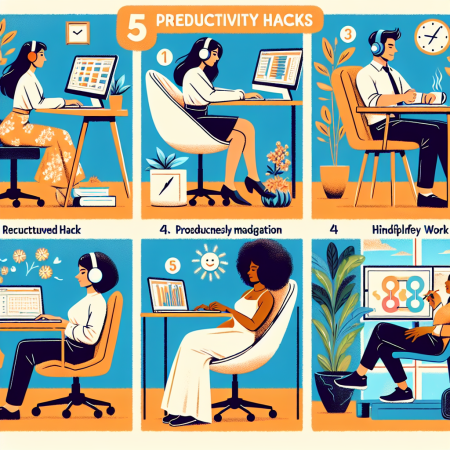5 Productivity Hacks for Remote Workers
Top 4 Semantic Keyword Phrases
- Remote work efficiency tips
- Home office productivity strategies
- Effective time management for remote workers
- Improving focus at home
Remote Work Efficiency Tips
Working from home can feel liberating but sometimes, it can be too liberating. Over time, I’ve found that structuring my day is essential. Mornings, in particular, are crucial. I start my day with a clear to-do list. This isn’t anything fancy – just a basic, handwritten list that I update daily.
One critical tip I’ve learned is to tackle the hardest tasks first thing in the morning when my brain is still fresh. That means no emails, no social media – I dive straight into my work. This method has tremendously increased my productivity levels.
Another crucial tip is to block off time for everything. I use a time-blocking technique where I schedule out my entire day in chunks of time. This keeps me on track and ensures I’m not wasting time drifting between tasks.
Home Office Productivity Strategies
If you’re serious about working from home, creating a dedicated workspace is a must. I converted a small corner of my bedroom into my office. Having this distinct workspace helps signal to my brain that it’s time to work, not relax.
Another strategy is investing in good office furniture. Ergonomics makes a big difference. I splurged on a high-quality chair and adjustable desk, which has been a game-changer for my back and posture.
Keeping your workspace tidy also plays a huge role. Every evening, I try to clean up my desk. It sounds almost trivial, but starting the next day with a clean space does wonders for my mindset and productivity.
Effective Time Management for Remote Workers
Time management is a skill in and of itself. One method I swear by is the Pomodoro Technique. It involves working for 25 minutes, then taking a 5-minute break. After four cycles, take a longer break – maybe 15 or 30 minutes. This technique has helped me maintain my focus and energy levels throughout the day.
Another great time management strategy is to set clear boundaries. When I’m ‘at work,’ I’m really at work. I let my family and friends know my work hours to minimize interruptions. It’s all about communication and setting expectations.
Lastly, I use various digital tools to help manage my time. Trello for project management, Google Calendar for scheduling, and tools like Focus Booster to keep track of my Pomodoro sessions. These tools help streamline my workflow and keep everything organized.
Improving Focus at Home
Focus is hard to come by, especially with the many distractions at home. One major rule I follow is minimizing noise. I use noise-canceling headphones sometimes, but even simple earplugs can work wonders when the household gets loud.
Creating a routine has been another game-changer for me. Knowing what to expect each day helps me settle into my work zone more quickly. It’s almost like I’m ‘clocking in’ and ‘clocking out’ mentally, even if I never leave the house.
Furthermore, I take regular breaks to keep my focus sharp. I’ve found that taking short breaks, like a quick walk around the block, helps refresh my mind. This way, I return to my work with renewed focus and energy.
Frequently Asked Questions
1. What’s the most important aspect of staying productive while working remotely?
The most important aspect is maintaining a structured routine. Setting clear boundaries and maintaining a consistent schedule can help you stay focused and productive.
2. How do I handle distractions while working from home?
Minimizing noise with earplugs or headphones, setting clear boundaries with family or housemates, and creating a dedicated workspace can help manage distractions effectively.
3. Are there any specific tools that can help with remote work productivity?
Yes, tools like Trello for project management, Google Calendar for scheduling, and Focus Booster for the Pomodoro Technique are excellent for enhancing productivity.
4. How important is ergonomics in a home office setup?
Ergonomics is crucial. Investing in a good chair and an adjustable desk can significantly improve your comfort and reduce strain, leading to better productivity and overall health.
Related Content
- What I Learned From Publishing Content Every Day for a Year
- How to Drive Website Traffic Without Breaking the Bank
- Why Every Great Coaching Business Starts with These 7 Steps
- How to Create a Marketing Strategy That Outperforms Your Competition
- Nourish brand identity by consistently expressing values through visual and verbal cues

